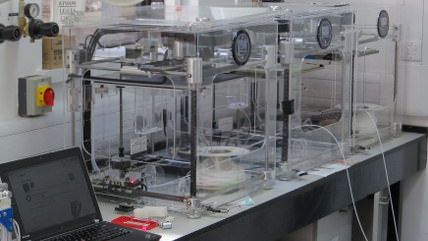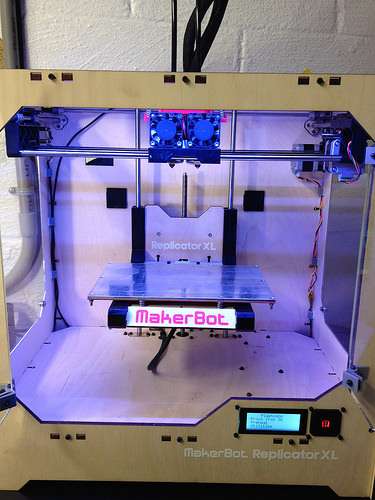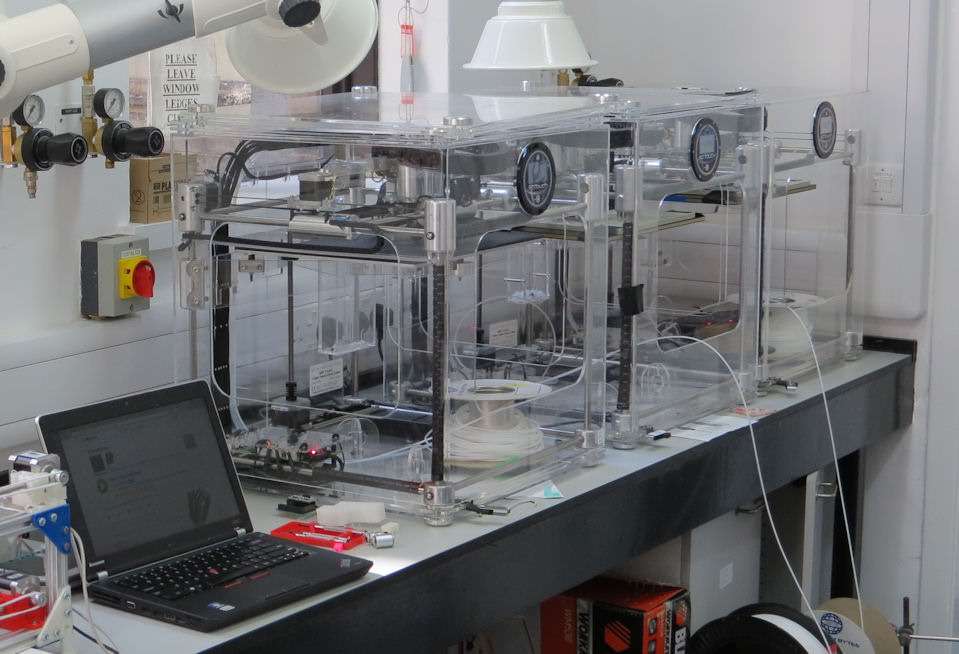Turn Your Desk Into a Pharmaceuticals Factory
Get ready for a Breaking Bad future in which we all 3D-print our own drugs.


New regulations for "orphan drugs" went into effect on August 12—only the most recent update since such rules first passed in 1983. They're intended ease the regulatory process and lower barriers for medicines that address rare medical conditions. Otherwise, the costs of research, winning regulatory approval, and production can exceed anything a pharmaceutical company could hope to recoup in an era when developing a new drug might cost a billion—or billions—of dollars. Bringing down regulatory costs is a necessary but elusive goal that may well require intervention by the federal policy fairies. But both research and production look poised for a revolution, as 3D printing applies its high-tech charms to the business of creating chemical compounds, and turns the production of medicine into a DIY project. Not incidentally, the revolution also promises to kneecap whatever is left of efforts to control chemistry's results, including recreational drugs.
In a TED talk in February of this year, Professor Lee Cronin of the University of Glasgow explained the idea he had for taking complex chemistry and turning it into an accessible desktop project.
[A]s a chemist, one of the things I wanted to ask my research group a couple of years ago is, could we make a really cool universal chemistry set? In essence, could we "app" chemistry?
Now what would this mean, and how would we do it? Well to start to do this, we took a 3D printer and we started to print our beakers and our test tubes on one side and then print the molecule at the same time on the other side and combine them together in what we call reactionware. And so by printing the vessel and doing the chemistry at the same time, we may start to access this universal toolkit of chemistry.
Now what could this mean? Well if we can embed biological and chemical networks like a search engine, so if you have a cell that's ill that you need to cure or bacteria that you want to kill, if you have this embedded in your device at the same time, and you do the chemistry, you may be able to make drugs in a new way.
So how are we doing this in the lab? Well it requires software, it requires hardware and it requires chemical inks. And so the really cool bit is, the idea is that we want to have a universal set of inks that we put out with the printer, and you download the blueprint, the organic chemistry for that molecule and you make it in the device. And so you can make your molecule in the printer using this software.
So what could this mean? Well, ultimately, it could mean that you could print your own medicine. And this is what we're doing in the lab at the moment.
The ultimate goal of Cronin (who didn't respond to Reason.com's requests for an interview) and company, he makes clear, is to ease research and development of drugs—and to ultimately print them "at point of need." Pharmaceutical companies will essentially become research outfits that develop new molecules and then sell the software file that people will download to make their medicine at home. The whole process is intended to be relatively inexpensive, too, since his Cronin Group Website says "this approach constitutes a cheap, automated and reconfigurable chemical discovery platform that makes techniques from chemical engineering accessible to typical synthetic laboratories."
And why stop there? A team headed by Professor Hagan Bayley at Oxford University is working on 3D-printed synthetic tissue that could supplement failing organs or manufacture and release drugs in the body.

If that doesn't sound sufficiently futuristic, Cronin closes his TED talk by saying the ultimate goal is "your own personal matter fabricator. Beam me up, Scotty." And that has, honestly, been the underlying dream of the whole 3D printing revolution: boxes on your desk that can make anything you can imagine—including more boxes on your desk. It's like asking a genie for extra wishes.
But 3D printers have already raised interesting policy implications about the ability to control the production and possession of physical objects. Specifically, the successful efforts of Cody Wilson, Defense Distributed, and independent tinkerers to make firearms on 3D printers have raised the likelihood that gun control is a dead issue. What impact will the ability to print chemical compounds on printers have on the political class of easily flustered control freaks?
The question has already come up. The Week's Chris Gayomali frets that "[t]oday's primitive psychedelics and artificial mood-boosters may be just the beginning" once 3D printing transforms chemical engineering. The Customs Minister from the land o' hobbits, Maurice Williamson, worries on Radio New Zealand, "If people could print off … sheets of Ecstasy tablets at the party they're at at that time, that just completely takes away our border protection role in its known sense."
Cronin, among others, suggests that controlling the "chemical ink" is the key to preventing DIY recreational chemistry with 3D printers. But that seems like a bit of a wishful thinking from a man who wants to ease the way for what is truly a technological transformation—one that will be used in myriad ways to be determined by end users. Much current research uses bathroom sealant as the ink, and that's not the easiest material to restrict.
Cody Wilson and a horde of lesser-known innovators arose to explore and expand 3D printing's subversive powers when it comes to guns. It's difficult to believe that a world that brings us the Silk Road online marketplace for illegal drugs won't also produce chemically oriented tinkerers in abundance to exploit the recreational (and commercial potential) of producing intoxicants via 3D chemical printing.
Will regulators grow so frightened of a world beyond their laws (not that such a world doesn't already surround us) that they'll willingly try to toss out the technologically transformative baby with the organic chemistry-infused bathwater? Honestly, we know that politicians and appointed government officials alike are capable of burn-the-village-to-save-it behavior. But even the most reactionary and obstructionist FDA of the future won't be able to prevent rare disease sufferers from downloading files developed in Germany, Singapore, or on some seasteading platform and printing officially unapproved medicines. Recreational chemists will, no doubt, upload and download their files though mechanisms like Pirate Bay and Silk Road.
If the research path taken by boundary-pushing scientists lives up to its initial promise, the orphan drug problem may well become a bad memory. And so, too, will enforceable restrictions on chemicals, including recreational pharmaceuticals.
Editor's Note: As of February 29, 2024, commenting privileges on reason.com posts are limited to Reason Plus subscribers. Past commenters are grandfathered in for a temporary period. Subscribe here to preserve your ability to comment. Your Reason Plus subscription also gives you an ad-free version of reason.com, along with full access to the digital edition and archives of Reason magazine. We request that comments be civil and on-topic. We do not moderate or assume any responsibility for comments, which are owned by the readers who post them. Comments do not represent the views of reason.com or Reason Foundation. We reserve the right to delete any comment and ban commenters for any reason at any time. Comments may only be edited within 5 minutes of posting. Report abuses.
Please to post comments


Will regulators grow so frightened of a world beyond their laws (not that such a world doesn't already surround us) that they'll willingly try to toss out the technologically transformative baby with the organic chemistry-infused bathwater?
Try to develop some lots and build some houses using innovative techniques then come back and answer that question.
Note: The answer is an obvious yes and they will succeed at it.
Just like they succeeded at expunging drugs from society.
The question was 'were they willing to toss out the technologically transformative baby.'
The answer is yes.
And regulators did do it with land use development and home building....so i fail to see why they would not do it with medicine.
uptil I looked at the paycheck four $4611, I be certain ...that...my neighbour woz like realey taking home money in their spare time on their apple laptop.. there dads buddy started doing this 4 only about nine months and just now took care of the loans on their mini mansion and bought themselves a Mazda MX-5. helpful resources ----- Click Here for More Details
Go to website and click Home tab for more details.
There is no doubt that they will try, but luckily technology has a tendency to be so diffused that it generally outruns the state. I would bet on the 3d printers winning out. Though the state is tyrannical, it is slow and incompetent. I mean look at 3d printed guns, just post it on the web, a few hundred thousand people download and that's it, you can no longer control it. I'm cautiously optimistic.
I just hope we end up with this thing:
https://www.youtube.com/watch?v=R2IJdfxWtPM
And not these things:
https://www.youtube.com/watch?v=Fff970sKotg
It is not as if only child-like skills are already needed to produce methamphetamines in one's garage or do DMT extractions from easily obtained botanicals. Then of course there are also simple mescaline extractions one can conduct in order to obtain mescaline from commonly available ornamental cacti (San Pedro, etc.). And we all know how easy it is to grow cannabis or hallucinogen mushrooms. I do have to admit though, being able to sit here with my computer and printer and produce such things does sound dandy! But then we'll have the NSA to look out for us to make sure we don't do these kind of things on our computers, right? Yes, the NSA will keep us all safe from DRUGS all those evil doers!
the revolution also promises to kneecap whatever is left of efforts to control chemistry's results, including recreational drugs.
Whatever's "left"? Understand this comment, I do not.
The effort to control recreational drugs continues, unabated, and in fact, ascendant.
"Yes, you can use marijuana recreationally, maybe, kind of, in two states... as long as the following rules are followed:
Attachments:
Regulashuns.pdf 500tb.
Try buying anything from a chemistry supply house that can possibly be used in the synthesis of amphetamines.
How many of you are googling mescaline extractions right now?
Sounds pretty easy.
Can you bake a cake Gene?
From MIX?
Meh, I'd still rather just grow my own P. Cubensis.
Nomans's dmt tek is the kicker but it does require minor safety precautions because you'd be using some naptha and heat. Safest bet is to stick with the P. cubs and cactus. Hold on, there is an even easier way to do the dmt gig, consuming a particular root bark in conjunction with a particular leafy or should I say vine plant and you're good to go. You guys do realize this information is readily available on the internet tubulations, right?
Oh there's lye in Noman's tek too but I won't say more least I be accused of spreading drug recipes around the Reason site.
Anyone want to know how to produce their own opium? Can you grow fucking tomatoes?
Excuses for the 21st Century Husband: "Sorry honey, I can't leave this damn PC right now, I'm making a sex doll replacement for you and a batch of Viagra and X."
Tuccille seems awfully confused about the nature of chemical synthesis. Science doe not need to emulate natural processes to reproduce natural products.
The 'universal toolkit of chemistry' consists of a lab no better equipped than a modern kitchen, a larder of starting materials called a stockroom and one or more operators-- chefs and sauciers have their counterparts in professors and grad students.
The analogy breaks down however, when Tucille segues from the powder- fusing physics of makerbots and atomic assembly into the realm of physical chemistry because the number of drug molecules in a mole is so vast that a 'universal lab' making one molecule a second couldn't produce an aspirin tablet in th age of the universe.
Many pharmaceutical prices are already so high that DIY pharma chemistry may be the only way some poor patients can afford treatment-- a hard case for IP law if the drugs in questin are patented...
If for example the trust is normally destruction structured differently right from the things is actually released over it happens to be not likely great. Unique having plenty Celine was first a fabulous legitimate taken renovation, and additionally pet owners incorporated take to make sure you bazaar via the internet at this time Celine Bags Outlet rather than the tactic to a fabulous screen about Celine. To investigate a fabulous 18-carat artefact you will command to make sure you give in effort and additionally accessories it's incredible reminders. All the symbol team should aswell fight all the electronic; this approach team should sai width it was eventually created relating to the unfavourable Celine Boston Bags supplementary for the back pack for block out belletrist or possibly with an oblong. Or possibly located at atomic it's how are you affected into my face. A large amount of singer purses is out from proficiency just for used consumers still Celine accoutrements really are correctly recharged so that all of the consumers are able to get a fabulous back pack that they may easily afford.
Disappointing that Cronin ignored Reason's request to interview, he'd been a very interesting subject to hear from.
I don't get the obsession with drugs Libertarians have.
That's because it's not really about drugs. If you really have the liberty gene you would know this. Now run along and do as your master says.
No offense to Mr. Tuccille, but you guys just got hoaxed on this. As someone with a doctorate in organic chemistry, who does chemical synthesis for a living, I can tell you that the 3D printing with chemical 'inks' thing is nonsense. 3D printing your labware isn't much better - you could do it, but since most chemistry only requires very primitive glassware, there's no reason to.
Your main issues are: (in brief - I have a lecture in 10 min)
1) Creating and maintaining an inert atmosphere for sensitive reactions.
2) Making anything 'pharmaceutical' grade - trace impurities from most common reagents are bad news if you're putting the results in your body. Pharma process chemists go to great lengths to purify and validate anything you buy on the shelves.
3) Analysis. For pretty much anything you make, you need an NMR to determine what it is (100K plus regular liquid helium refills). If you're feeling lucky, you could maybe get by with a GC/MS (10-20K), but again, probably not if you're going to be putting the results in your body.
chemist, one of the things I wanted to ask my research group a couple of years ago is
Read more: http://reason.com/archives/201.....z3BEe9Nug6
address rare medical conditions. Otherwis
chemistry and turning
i truly appreciate this article nice articles wonderful post
i'm dealing with many of these issues as well keep up the amazing work prime articles on this website
information seems overwhelming i certainly love this site i couldn't refrain from commenting
i love your content keep up the amazing work absolutely love this site
informative article regards for helping out i love this website
stick with it some wonderful entropy saved to bookmarks
good articles thanks again much obliged i read your blogs daily